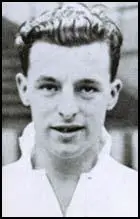Jack Atkinson

John (Jack) Atkinson was born in New Washington on 20th December, 1913. He played for Washington Colliery before joining Bolton Wanderers in 1931. A centre-half, he made his first team debut in a 2-2 draw at home to West Bromwich Albion in April 1933.
Atkinson was a member of a team that included Harry Goslin, Jackie Roberts, Don Howe, Ray Westwood, Albert Geldard, George Hunt, Harry Hubbick, Tom Woodward and George Eastham.
As the authors of Wartime Wanderers point out: "Atkinson was a giant of a centre-half, around whom the entire defence would mould itself. He possessed a no-nonsense attitude on the field that made him the ideal minder for the club's more skilful players. Any opposing defender who chose to stop Ray Westwood by foul means would soon have Jack Anderson chasing after them to mete out instant retribution. In contrast to these extrovert displays of almost naked aggression on the pitch, away from the ground Jack was the archtypal strong, silent type not given to outbursts of emotion.
On 15th March, 1939, Adolf Hitler ordered the German Army to invade Czechoslovakia. It seemed that war was inevitable. On 8th April, Bolton Wanderers played a home game against Sunderland. Before the game started, Harry Goslin, the team captain, spoke to the crowd: "We are facing a national emergency. But this danger can be met, if everybody keeps a cool head, and knows what to do. This is something you can't leave to the other fellow, everybody has a share to do."
Of the 35 players on the staff of Bolton Wanderers, 32 joined the armed services and the other three went into the coal mines and munitions. This included Harry Hubbick, who resumed his career down the pits and Jack Atkinson joined the local police force. A total of 17 players, including Harry Goslin, Danny Winter, Billy Ithell, Albert Geldard, Tommy Sinclair, Don Howe, Ray Westwood, Ernie Forrest, Jackie Roberts, Jack Hurst and Stan Hanson, joined the 53rd (Bolton) Field Regiment.
The government imposed a fifty mile travelling limit and the Football League divided all the clubs into seven regional areas where games could take place. Bolton Wanderers was put in the North-East League. The team included those players like Jack Atkinson, Harry Hubbick and George Hunt, who had been employed on the home front. Walter Sidebottom, a teenager who only got in the first-team at the end of the 1938-39 season emerged as a player with a very bright future. In the 1939-40 season Bolton won 13 out of their 22 games and finished in 4th place in the North-East League.
Atkinson eventually joined the 53rd (Bolton) Field Regiment and took part in the invasion of Italy. On 24th September, 1943, Lieutenant Harry Goslin and his men landed at Taranto. Three days later the men had reached Foggia without too much opposition. However, when the men were ordered to cross the River Sangro the regiment took part in some of the most difficult fighting of the Second World War. Atkinson was employed as a driver of 15 hundredweight trucks ferrying equipment and ammunition to the front-line.
After the war Atkinson returned to Bolton Wanderers and was the regular centre-half in the 1946-47 season. He lost his place in the side in the following season and in April 1948, after playing in 263 cup and league games, joined New Brighton as player-manager.
Jack Atkinson died in 1977.
